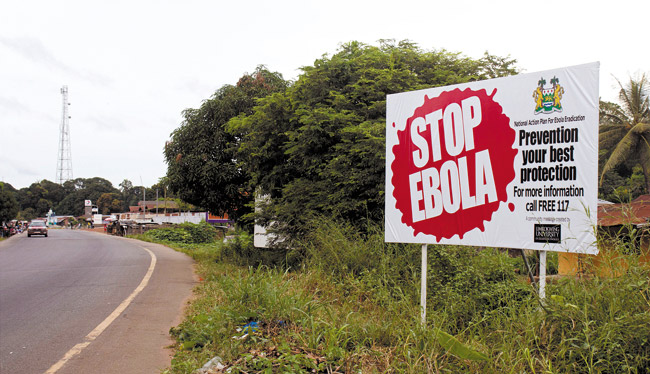Being Realistic In Our Scary World

In this photo taken Oct. 21, a billboard reading ‘Stop Ebola’ has been placed on Masiaka Highway, forming part of a trans-West African highway, which links all West African states, on the outskirts of the capital city of Conakry, Guinea AP PHOTO/YOUSSOUF BAH
I’m in New York City, staying in a hotel smack in Times Square amid the teeming masses and a mere 15-minute cab ride from the World Trade Center.
To the fearful, emotionally terrorized by late-breaking news, I might as well be in The Walking Dead TV show, surrounded by zombies.
It’s Halloween scary.
With Islamic State terrorists calling across the Internet for “Lone Wolf” (a total insult to a noble animal) attackers to carry out jihad against Americans, including beheading babies and elderly alike, some might feel like crawling underneath their kitchen sinks with a Bible and a beer. (Actually, that might only be me.)
And then there’s Ebola, the spookiest disease since the bubonic plague, which first struck China, one of the world’s busiest places for trade and commerce, then spread to Europe during the Middle Ages. According to themiddleages.net, in just five years, 25 million people died of the disease (1347-1352).
It was “Nightmare on Every Street.”
It took forever to figure out that it was those dirty rats and unwitting fleas that were making them so sick. And, like Ebola, the black plague (as the Brits called it because of the black spots that appeared on infected bodies), spread like cream cheese on a hot bagel.
According to the site, an eyewitness tells what happened:
“Realizing what a deadly disaster had come to them, the people quickly drove the Italians from their city. But the disease remained, and soon death was everywhere. Fathers abandoned their sick sons.
Lawyers refused to come and make out wills for the dying. Friars and nuns were left to care for the sick, and monasteries and convents were soon deserted, as they were stricken, too. Bodies were left in empty houses, and there was no one to give them a Christian burial.”
The disease struck and killed people with terrible speed. The Italian writer Boccaccio said its victims often “ate lunch with their friends and dinner with their ancestors in paradise.”
If ever there were a place that Ebola could overwhelm the CDC and every hospital, it would be right here where I am, NYC.
Yet our fear of ISIS pales in comparison to the threat of Ebola to the West Africans. I doubt any Islamic State terrorists will be targeting Liberia, Sierra Leone or Nigeria as a first priority, yet more than 5,000 of the 10,000 currently infected people have died there since March. One source predicts that 25,000 will be infected by December. West Africa’s bubonic plague indeed.
But does all this fright-night forecast mean that you or I should quiver under the covers until it’s all over?
It’s too late for me, I guess. In February I’m eagerly traveling back to Swaziland in South Africa to work at Heart for Africa’s Project Canaan and cuddle with our beloved abandoned babies (heartforafrica.org).
Some people, even (especially) in my own family, think I’m crazy, but here’s why I’m not afraid: From Monrovia, Liberia, to Swaziland is approximately 3,400 miles, just shy of the distance between Hawaii and Dallas. South Africa, the country in which we land and process through immigration, has had a stringent and highly successful medical screening for years to prevent the influx of yellow fever from countries in Africa that have that disease. Actually, to date, the Ebola scorecard has the U.S.-6, South Africa-0.
The trick this Halloween is to be safe yet realistic. The treat is that the odds of Americans being killed by ISIS or infected with Ebola are very, very low.
Let us remember this: World Health Organization has blamed the spread of Ebola through West Africa on “poverty, lack of education and crumbling public health systems …”
If you can’t join me in Africa, please be generous in your year-end giving to help those who live in the scary conditions we see on high-definition TV from our cozy family rooms with a clean, equipped hospital close by.
Don’t be spooked, be supportive.
susanpagecoffee@gmail.com





